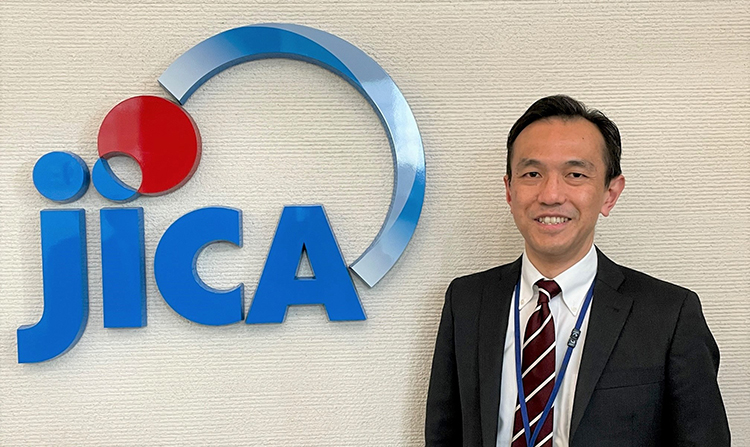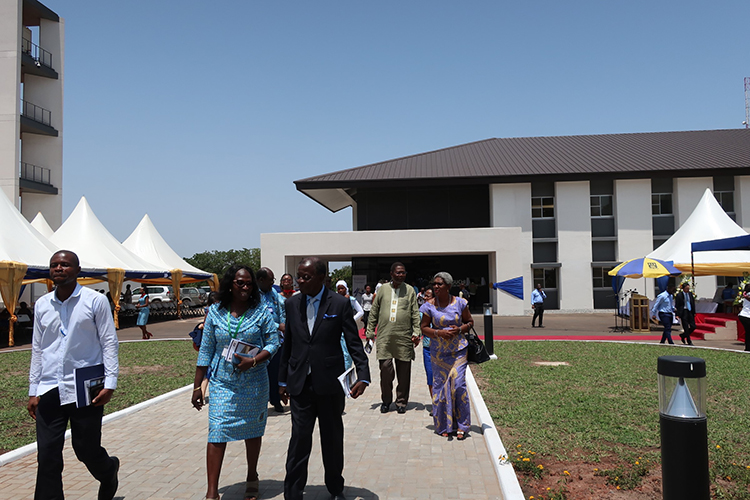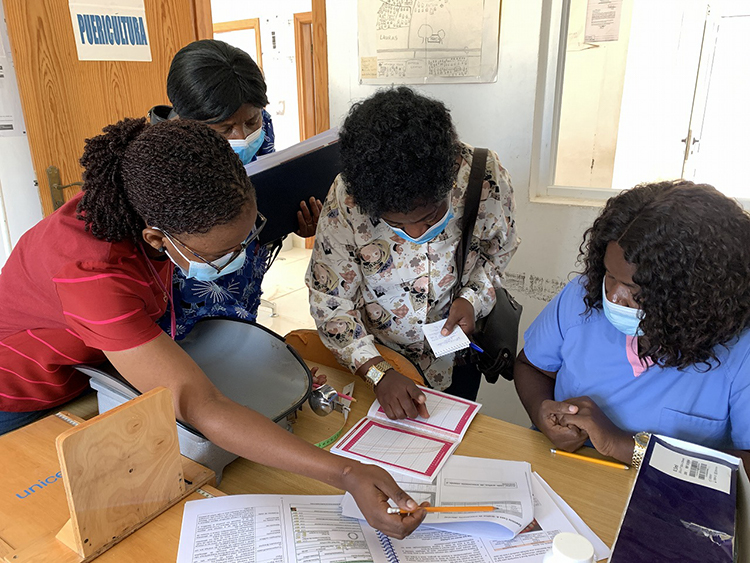TICAD 8 Looks at Opportunities to Deliver Results on an Individual Level for Post-Corona Africa: Q&A with YAKUSHI Hiroyuki
May 18, 2022

YAKUSHI Hiroyuki, Senior Director with JICA (Japan International Cooperation Agency)
"Many separate interests from around the world are involved in Africa. That's a good thing, but what we really want to emphasize at TICAD8 is the uniqueness and significance of Japan's cooperation with Africa." YAKUSHI Hiroyuki, Senior Director with JICA (Japan International Cooperation Agency) talks with us about the upcoming eighth Tokyo International Conference on African Development (TICAD), being held this year, and how Japan is working together with people and nations in Africa to build strength, resilience, and above all ownership in order to ensure stability band human security in the face of COVID, climate change, food security and other crises.
Q: JICA has been cooperating in Africa for many years. How has this experience contributed to Africa's response to the COVID-19 pandemic?
There have been many cases in which JICA's long years of cooperation contributed to meeting emergent needs during the COVID-19 pandemic. For example, about 40 years ago, JICA started cooperating with the Noguchi Memorial Institute for Medical Research (NMIMR) in Ghana, and continues to this day. The NMIMR has been very active in conducting frontline research on countermeasures against infectious diseases including during Ebola outbreaks. With this rich experience accumulated over so many years of cooperation, when the COVID-19 pandemic emerged, NMIMR took on a significant role in the country as 80% of PCR testing was done there. JICA has also been preparing equipment and materials for the development of vaccine supply chain for vaccines.

Noguchi Advanced Research Laboratories in Ghana's Noguchi Memorial Institute for Medical Research
Q: What kind of things can Japan do to promote vaccination?
The Government of Japan has been contributing to the COVAX system and is involved in vaccine dissemination efforts at a fairly high level internationally.
As JICA, we made financial contributions through the African Export-Import Bank (Afrexim) with other Japanese banks, to manufacture medical and pharmaceutical products such as vaccine-manufacturing lines, develop supply bases for those products, and develop medical and health facilities such as hospitals.
JICA has also taken the role of supporting the supply chain through which vaccines are distributed. We're working to create a long-term, self-sustaining, and robust system. Last year, JICA made grant agreements with Ghana, Malawi, Mozambique, and Senegal - to provide epidemiological survey instruments and "cold chain" equipment for vaccines and other materials that need to be kept at low temperatures. These grants contribute to last-mile support to ensure each of these countries can vaccinate their people. JICA also contributes to capacity development for African countries to build and operate vaccination systems on the ground.
As a development organization, we not only work to meet the urgent needs of vaccination, we also put importance on building resilient health system as a whole through "JICA's Initiatives for Global Health and Medicine".
Related Link: JICA's Initiatives for Global Health and Medicine
Q: What are some JICA assets that are helping to build resilience in Africa?
"Human resource development through enriching experiences" and "utilization of Japan's experiences and expertise" are some of JICA's assets that have been useful in building resilience in Africa. For example, the ‘KAIZEN' approach which supported Japan's economic growth in the 1960s and ‘70s., or the "Mother and Child Health Book," which was widely used in Japan after the war to protect the health of mothers and their children during pregnancy and infancy, are now being applied in many countries in Africa through JICA's cooperation. Both approaches contribute to economic and social resilience, and involve human resource development as our African counterparts take the core initiative by using Japan's experiences.

Instruction on how to fill out "Mother and Child Health Book" in Angola
Q: Is human security important to building long-term trust?
JICA's mission is to build trust with the world, including Africa, through our cooperation, and I believe our focus on human security is the key to achieving this mission. Human security is about delivering the freedom of individuals from poverty and fear. In the international community, the concept of national security is well developed. However, because the ultimate role of governments is to protect the individual within the state, JICA always puts importance on connecting our government-based cooperation properly to the individual. With this, we believe that trust between African governments and their people as well as between African people and Japanese people will be firmly developed. Commendation to JICA by the Parliament of Uganda in December 2021 for its support to Uganda was symbolic of our trust between Ugandan people and Japanese people.
Related Link: Commendation to JICA by the Parliament of Uganda (external link)
Q: What do you mean by "connected to the individual"?
For example, in education or health services, the ultimate beneficiary is the individual. That sort of welfare is a basic right. Without such basic service delivery by the government, people cannot choose their own path in life. One of the most important roles of the government is to provide "opportunities" to its people, and JICA focuses on supporting governments in such a role. We create projects from the viewpoint of providing services linked to individual benefits.
Q: What is the value of JICA's approach in Africa?
First is "focus on people" as I mentioned above. Second is "utilization of Japan's experiences". Japan has a unique position because of its long history of development as a non-Western society. Japan was able to achieve modernization by keeping our own tradition and identity. There are many lessons learned as well. Sharing Japan's unique experiences and lessons is something only JICA can do. The third is "respecting Africa's ownership". The people of Africa know the solutions for their issues, and they are the ones who can solve their own problems. What JICA can do is share our experiences and expertise, think together, and provide technical or financial support based on their requests. That is the reason we do not call our activities "assistance" or "aid", but "cooperation".
Q: What is the main goal of TICAD 8 for JICA? What are you hoping to achieve?
Because this is the first TICAD after the pandemic, we want to use TICAD8 as an opportunity to tighten our partnership with African countries and other partners to better overcome the social and economic difficulties caused by the pandemic, and in the long term build a resilient society. That is, a society that can withstand external shocks without collapse, whether from issues like climate change, or the effects of crisis from outside the continent.
In addition, it would be our hope that the people of Africa consider the value of Japan's cooperation and deepen our mutual trust. Africa is in the process of rapid growth and change. Now change is happening in the new post-COVID era and there will necessarily be adjustments. There are also drastic changes taking place around the world and global stability is at stake. Amid these changes facing us, I believe that JICA's unchanging principle of Human Security with democratic values is more important than ever for Africa.
With such values and JICA's long history of assets, JICA adds further value to its approach by utilizing digital techniques and innovation, especially through strong partnerships with the private sector to meet the needs of emerging new challenges. TICA8 is an excellent opportunity for JICA to share and discuss both our traditional and our new values with our African partners so that we may foster and deepen a renewed relationship to build Africa even better in this new era together.

TICAD 7
Related Links
- International Crises Highlight the Importance of International Cooperation in Africa: Looking ahead to TICAD 8 (May 11, 2022)
- The COVID Crisis has Highlighted the Importance of "Ownership" During Times of Instability (June 2, 2022)
- Three Decades of Promoting Ownership and Partnership: A Look at the History of TICAD (July 14, 2022)

